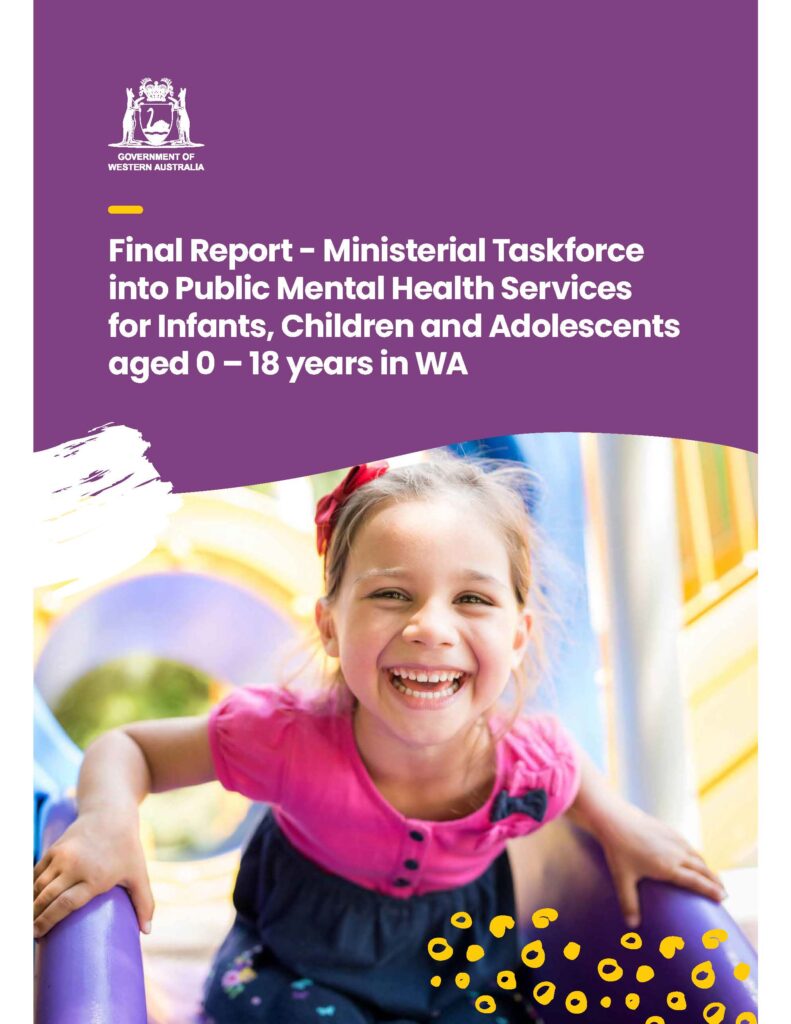Final report: Ministerial Taskforce into Public Mental Health Services for Infants, Children and Adolescents aged 0 – 18 years in WA

In late 2020, the Chief Psychiatrist reviewed the care of Kate Savage, a 13-year-old who
tragically died while under the care of the Child and Adolescent Health Service (CAHS). The review recommended that a taskforce be formed to rebuild specialist public child and adolescent mental health services across WA. In early 2021, the Ministerial Taskforce into Public Mental Health Services for Infants, Children and Adolescents in Western Australia was launched by the then Minister for Mental Health and Health. The final report was published in March 2022 and will inform the planned reforms of WA’s mental health service.
The evidence from children, families, carers and clinicians, data modelling and our research points to an ICA metal health system in crisis. The Emerging Directions Report acknowledged that the increased incidence, complexity, and early onset of mental ill-health in children is not unique to WA and is evident across Australia and other developed countries.
Regardless, the trends in WA and the impact on children, families, carers and clinicians are deeply troubling and the need to reform ICA mental health services is urgent. The number of children attending an emergency department seeking urgent help for their mental health has grown drastically in recent years, and the number of children presenting to hospitals with the risk of, or sadly having died from, suicide has increased by 50 percent over the last four years.
It has been impossible to view the current situation as anything other than one that requires immediate and sustained action supported by significantly increased investment.
Approximately 14 per cent of 4–17-year-olds in WA experience a mental health issue, with prevalence being even higher for children in regional areas and from vulnerable communities. More and more children are experiencing a severity of mental ill-health that means they need to be referred to a specialist service – an increase of more than 70 per cent since 2014.
But funding of these services has not kept up with this increase in demand.
Today, although children make up almost 25 per cent of the WA population only eight per
cent of all mental health funding goes to services for infants, children, and adolescents.
The consequence is that these services are much harder to access than they were ten years ago, with less than one in five children being accepted into treatment programs. Increasingly, services are, in effect, rationing care to treat older children and those with more severe symptoms and at a higher risk.
We have also found that the system struggles to meet the needs of some children more than it does others. This has created a system in which access and outcomes for children from various communities are inequitable. Children in regional and remote WA are more likely to attend an emergency department regarding a mental health condition, however, are less likely to receive community treatment when referred and even less likely to access Perth-based specialised services.
Many groups of children including Aboriginal children, children from ethnoculturally and linguistically diverse backgrounds, LGBTGI+ children, children with neurodevelopmental conditions, children in care, and children in contact with the justice system are missing out and do not receive the specialist care they need.
The ICA Taskforce met with hundreds of children, parents, carers, clinicians, system leaders and other important voices. While many have acknowledged the hard work, professionalism and compassion of clinicians, the overall picture that is painted by those we have listened to is that services are failing children in need.
We have heard children tell us they felt rejected, that their experience was one of cruelty. We have heard from families exhausted by trying to seek help for their children, often being so deeply affected that their own mental health has been impacted. We have heard from clinicians, exhausted and desperate that every day they face the tough choice to provide care for one child ahead of another.
Reference: Chair of the Ministerial ICA Taskcorce, Robyn Kruk AO. (2022). Final report – Ministerial Taskforce into Public Mental Health Services for Infants, Children and Adolescents aged 0 – 18 years in WA. Pages 6 – 7.
Why Things Have to Change

Mental health is arguably the biggest challenge facing children, families, and carers in WA. Taskforce has found that current ICA mental health services are unable to meet increasingly high levels of need among children across the state. This has been the case for a prolonged period of time. More children are being referred to community services; more children are being admitted to hospital for mental ill-health conditions; and more children are presenting to emergency departments when facing a crisis, including many that self-harm or seek to take their own lives. As services struggle to respond to growing demand, children, families, and carers are having increasingly negative experiences and some receive little or no care until they become severely unwell.
Vulnerable groups of children are not receiving equitable care and outcomes. Regional and remote children have higher rates of mental ill-health, yet disproportionately lower access to services. Aboriginal children face increasingly high-levels of vulnerability to mental illhealth, including high rates of suicide, but face many obstacles to accessing care. Children with complex needs, including those with neurodevelopmental or neuropsychiatric conditions, those in care, and those in contact with the justice system, struggle to access care. LGBTQIA+ children and children from ethnoculturally and linguistically diverse (ELD) backgrounds face unique risks and challenges receiving care.
Currently, due to resource constraints, ICA mental health services have narrowed their focus to meeting the needs of older children who have more severe symptoms and/or are higher risk, through increasingly episodic, fragmented and hospital-based treatment. Infants (aged 0-4) and younger children (aged 5-11) have limited, if any, access to services, while children with moderate mental ill-health needs are often told they are ‘not unwell enough’. Meanwhile, primary health and other services do not have the capacity to meet the needs of children in the community and other services that play a critical role in a child’s life (e.g. schools) are not supported to best help children with mental ill-health needs.
As the number of children seeking mental health services has risen over the years, growth in the funding of services has been minimal and has not kept up with demand. The workforce is under capacity, under stress, and does not have the capabilities, diversity and support structures required to meet the needs of all children, families and carers safely and effectively. The scale and skill base of the workforce needs to grow and diversify significantly, but capacities to attract, support and retain clinicians are underdeveloped. In many instances, infrastructure is not appropriate for children, families and carers, and information and digital technology does not adequately support the information and care needs of children, families, carers and clinicians. Taskforce has concluded that services do not operate as a system – they work in siloes with little connection or collaboration,
and without common governance, strategy, service models and resources.
Three key changes that the IAC Taskforce want to achieve, that closely align with the Emmanuel Centre’s mission include:
Specific services for children with complex needs, including neurodevelopmental conditions, children in care, children in contact with the justice system, and others.
Greater support for children, families and carers as they transition to other services, as they complete their treatments, and as they move to youth or adult services.
Greater collaboration with schools to assist in the early identification and response to mental health support for children, families and carers.
We believe that the Church in WA is ideally situated to provide pastoral support to help address these issues, working closely with Catholic schools, parents and parishes to
Reference: Final report – Ministerial Taskforce into Public Mental Health Services for Infants, Children and Adolescents aged 0 – 18 years in WA. (2022). Pages 8 – 13.

